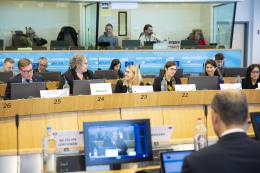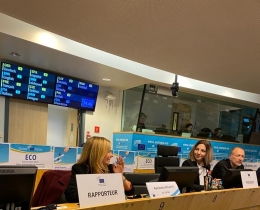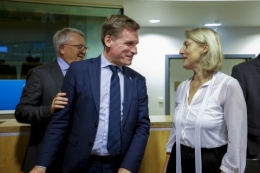European Economic
and Social Committee
Subscribe
Main navigation
-
Bemutatkozás
ABOUT
The European Economic and Social Committee (EESC) is the voice of organised civil society in Europe.
Find out more about its role and structure at http://www.eesc.europa.eu/en/about
- Politikai szervezet
- Adminisztratív szervezet
- EGYÜTTMŰKÖDÉS MÁS INTÉZMÉNYEKKEL
- Rules
-
Tevékenységeink
OUR WORK
The EESC issues between 160 and 190 opinions and information reports a year.
It also organises several annual initiatives and events with a focus on civil society and citizens’ participation such as the Civil Society Prize, the Civil Society Days, the Your Europe, Your Say youth plenary and the ECI Day.
Find the latest EESC opinions and publications at http://www.eesc.europa.eu/en/our-work/opinions-information-reports/opinions and http://www.eesc.europa.eu/en/our-work/publications-other-work/publications respectively.
- Vélemények és tájékoztató jelentések
- Dokumentumok
- Kiadványok és egyéb munkák
-
Civil társadalom és állampolgári szerepvállalás
- European elections 2024
- Civil Society Week 2024
- Civil társadalmi díj
- The Conference on the Future of Europe
- Civil társadalmi napok
- Az európai demokrácia útlevele
- Your Europe, Your Say!
- Az európai polgári kezdeményezés
- The path to our industrial future
- Youth Climate and Sustainability Round Tables
- EU Organic Awards
- Civil Society Against COVID-19
- EESC stands with Ukraine
- Partnerships
- Relations with ESCs
-
Szakpolitikák
POLICIES
The EESC is active in a wide range of areas, from social affairs to economy, energy and sustainability.
Learn more about our policy areas and policy highlights at http://www.eesc.europa.eu/en/policies
-
Szakpolitikai területek
- Mezőgazdaság, vidékfejlesztés és halászat
- Éghajlat-politika
- Kohéziós, regionális és városfejlesztési politika
- Fogyasztók
- Digitális átalakulás és információs társadalom
- Gazdasági és monetáris unió
- Oktatás és képzés
- Foglalkoztatás
- Energia
- Vállalkozáspolitika
- Környezetvédelem
- Külkapcsolatok
- Pénzügyi szolgáltatások és tőkepiacok
- Alapvető jogok és a polgárok jogai
- Ipar és ipari szerkezetváltás
- Intézményi ügyek és uniós költségvetés
- Migráció és menekültügy
- Kutatás és innováció
- Általános érdekű szolgáltatások
- Egységes piac
- Szociális ügyek
- Fenntartható fejlődés
- Adózás
- Közlekedés
-
Szakpolitikai területek
-
Naptár
AGENDA
The EESC holds nine plenary sessions per year. It also organises many conferences, public hearings and high-level debates related to its work.
Find out more about our upcoming events at http://www.eesc.europa.eu/en/agenda/our-events/upcoming-events
- Rendezvényeink
-
Hírek és média
NEWS & MEDIA
Here you can find news and information about the EESC'swork, including its social media accounts, the EESC Info newsletter, photo galleries and videos.
Read the latest EESC news http://www.eesc.europa.eu/en/news-media/news and press releases http://www.eesc.europa.eu/en/news-media/press-releases
- President
-
Tagok és csoportok
MEMBERS & GROUPS
The EESC brings together representatives from all areas of organised civil society, who give their independent advice on EU policies and legislation. The EESC's326 Members are organised into three groups: Employers, Workers and Various Interests.
Find out more about our Members and groups at http://www.eesc.europa.eu/en/members-groups
- Tagok
- Csoportok
-
Szekciók és más szervek
SECTIONS & OTHER BODIES
The EESC has six sections, specialising in concrete topics of relevance to the citizens of the European Union, ranging from social to economic affairs, energy, environment, external relations or the internal market.
Find out more at http://www.eesc.europa.eu/en/sections-other-bodies
-
Szekciók / CCMI
- „Gazdasági és monetáris unió, gazdasági és társadalmi kohézió” (ECO)
- „Egységes piac, termelés és fogyasztás” (INT)
- „Közlekedés, energia, infrastruktúra és információs társadalom” (TEN)
- „Foglalkoztatás- és, szociálpolitika, uniós polgárság” (SOC)
- „Mezőgazdaság, vidékfejlesztés és környezetvédelem” (NAT)
- „Külkapcsolatok” (REX)
- Ipari Szerkezetváltás Konzultatív Bizottsága (CCMI)
- Megfigyelőközpontok
- Egyéb
-
Szekciók / CCMI
- Ukraine








